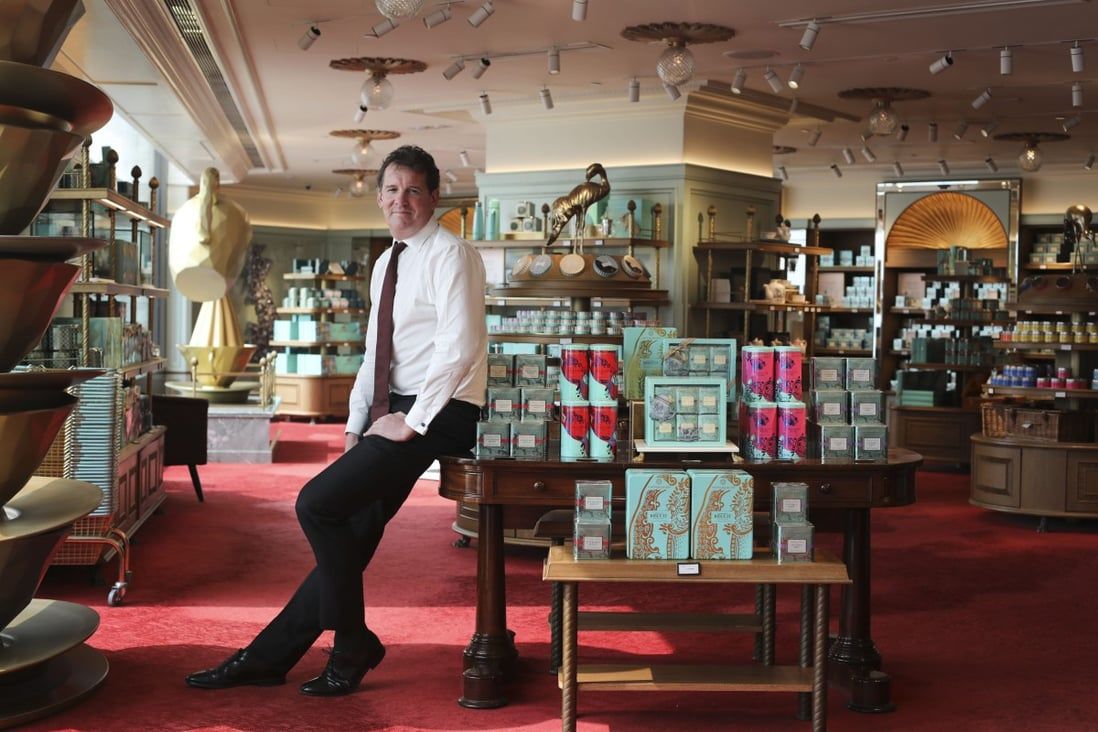Hong Kong News

Fortnum & Mason bets on customer experience to thrive in post-Covid world
As many retailers expand their online stores to attract customers, Britain’s most famous grocer Fortnum & Mason believes the future of premium goods and services is all about bringing customers unique in-store experiences.
“Gone are the days when you walk into a shop and just pick up a product and buy it, people are looking for something different,” said Tom Athron, the luxury retailer’s CEO, in an interview.
Fortnum & Mason, an upmarket London department store that counts itself as the royal family’s greengrocer, said customers in the post-pandemic era are looking to be stimulated and inspired.
For example, visitors to the company’s flagship store in Hong Kong can create their own tea blends at a dedicated work station.
In particular, younger consumers prefer to spend money on experiences rather than physical items. Luxury was once based on exclusivity, said Athron, which is not what customers stand for today.
 Fortnum & Mason CEO Tom Athron photographed in Tsim Sha Tsui.
Fortnum & Mason CEO Tom Athron photographed in Tsim Sha Tsui.
“Customers are looking for incredible standards and brilliant service, unforgettable experiences, extraordinary food and done in a way that is warm and inclusive and welcoming and friendly,” said Athron during his first trip to Hong Kong since becoming CEO in December 2020.
As tourism returns and foot traffic picks up a street level, Athron said Fortnum is seeing a return to profit. Company turnover was £185 million (HK$1.75 billion/US$222 million) last year, 30 per cent higher than its pre-pandemic revenues.
The company is confident its Hong Kong stores will soon be brimming once more with customers from mainland China. Already it has noticed a pickup in traffic around Tsim Sha Tsui where its flagship store can be found in the K11 Musea shopping mall.
Last year the company launched a small selection of its products on the e-commerce platform T-mall, which is operated by Alibaba Group, the owner of the Post. It also opened its first travel retail boutique in Asia in Hong Kong’s international airport.
Since Beijing abruptly scrapped its strict zero-Covid policies late last year, the food, retail and tourist sectors have had to ramp up their operations in readiness for a potential wave of tourists from the mainland.
The Hong Kong government simultaneously launched the “Hello Hong Kong” campaign, which included HK$100 million (US$12.7 million) of spending vouchers, events and giveaways of flight tickets to attract international tourists.
Hong Kong’s high-street retailers are likely to see rents rise by as much as 10 per cent this year, according to CBRE, surpassing other markets in Asia-Pacific as a surge in mainland Chinese tourists boosts consumption.
Fortnum & Mason’s shop in K11 Musea boasts 7,000 square feet of space that houses a tea blending station where customers can package their own loose leaf tea.
Athron believes investing in Hong Kong was the right choice, even though the timing was unfortunate; the company opened its first store not long before the 2019 pro-democracy protests, which were immediately followed by the pandemic.
“I suspect that the people will come, I just think we have to be patient,” said Athron, referring to an anticipated influx of travellers to Hong Kong from mainland China.
He said the group will take “what we’ve learned from Hong Kong” and find other opportunities to set up shop in the region. Its sights are set on Macau and Singapore.
The dropping of barriers between mainland China and Hong Kong will catalyse a rebound in retail sales, said Michael Cheng, PwC’s Asia-Pacific, mainland China and Hong Kong consumer markets leader.
Tourism will begin to slowly recover, with an estimated 20 million visitors coming to Hong Kong this year, a third of the peak of 65 million in 2018, Cheng said in the firm’s latest retail forecast released on February 9.
He sees retail sales increasing by 13 per cent to around HK$395 billion.
The luxury sector may grow by 40 per cent in 2023, supported by the recovery in tourism and a strengthening of the Chinese currency, said Cheng.
Cheng believes Hong Kong is well placed to benefit, if it focuses on unique or customised products at the forefront of the latest international trends and leverages its cosmopolitan shopping experience to cater to Asia’s high spenders.
Athron said the company anticipates 10 per cent annual growth globally. It could take some time for consumers in China to adjust to the post-pandemic environment, as was the case in the UK.
“The world has changed, customers are not behaving the way you may expect and they certainly don’t behave in the way that they did pre-Covid,” said Athron.











